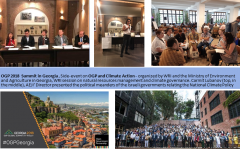
AEJI has participated at the “Open Government Initiatives for Climate Action and Sustainable Development” event, organized by WRI with co-hosting of the Ministry of Environmental Protection and Agriculture of Georgia in the margins of the OGP Summit in Tbilisi, was held on July 16 2018 at the Environment Ministry’s headquarters in Tbilisi.
Background
Since 2015, 17 countries have made National Action Plan (NAP) commitments that aim to accelerate effective and equitable climate action, underscoring the importance of open government to achieving climate and sustainable development goals. The event had brought together OGP members from government, civil society and international organizations with diverse background and experiences in open government, with aimed to take stock of lessons learned in the implementation of these commitments. With emphasis on peer exchange and learning, the discussants shared their insights and analysis on the national strategies for making climate commitments that are impactful and better linked to sustainable development goals and citizen-driven priorities.
The Specific areas of focus that were presented included new models of civic engagement to help countries meet their international climate commitments; better data sharing across national and subnational governments to accelerate progress on mitigation targets and promote low-carbon urban development; and tools that can help address governance challenges in the climate sphere.
The program included 3 main sessions with defined goals as following:
1) The promise and the progress of opening climate governance
Goal: Provide clear examples of the types of data city authorities and civil society need to best contribute to the implementation of climate actions and plans; highlight good practices and cautionary tales.
2) Engaging the public in planning for climate change: enhancing collaboration and partnerships
Goal: Provide space to share experiences in implementing public participation processes and identify common challenges and innovations to respond to these challenges.
3) Using National Action Plan commitments to catalyze more ambitious climate action: learning from the design and implementation of climate commitments to date
Goal: Develop common understanding of how OGP commitments can support
implementation of the Paris Agreement through knowledge exchange and the development of recommendationsfor more ambitious and actionable commitments.
AEJI participation:
As reported, Panels speaking about the value of #transparency, strong national long term commitments on climate. The total number of climate commitments in #OGP is small, IRM registers only high highly impactful.
AEJI’ director, Carmit Lubanov, presented at the 3rd session briefly review of the climate national policy in Israel since its establishing on 2010 (prior to Israel joined the OGP in 2012). Although the serious way was identified the beginning of Climate plan concerning the CO2 mitigation strategic commitments in Israel, two main courses have recognized the Israeli NAP since then: ‘Political will’ and the ‘Political meandering’, which led to change the government decisions on Climate NAP. After initiating the first mitigation stage of Climate plan (2010-13), the government of Israel decided on ‘freezing’ the NAP, and two years later on cancelling it. Only on April 2016 the government of Israel approved the CO2 targets commitments as submitted to UNFCCC prior COP21 in 2015.
The prism that according to AEJI the Climate NAP should be evaluated and advance is economic framework, in which needed to formulate new tools to finance the NAP, especially in the case of Israel where the expenditure directed to climate plan in state budget is neglecting. According to AEJI Climate Economy research, Israel could relatively easily bridge the budgetary gap by means of carbon pricing. Carmit mentioned the “Fair Carbon Tax Model” AEJI has formulated in order to create response to needs and providing economic tools to finance NAP. Also related the need of adopting ‘Climate Security Strategy’ (CSS) and the need in changing the discourse in Israel to “Mitigation of Climate Risk and Adaptation to Climate Security”, initiated in 2017 by AEJI.

